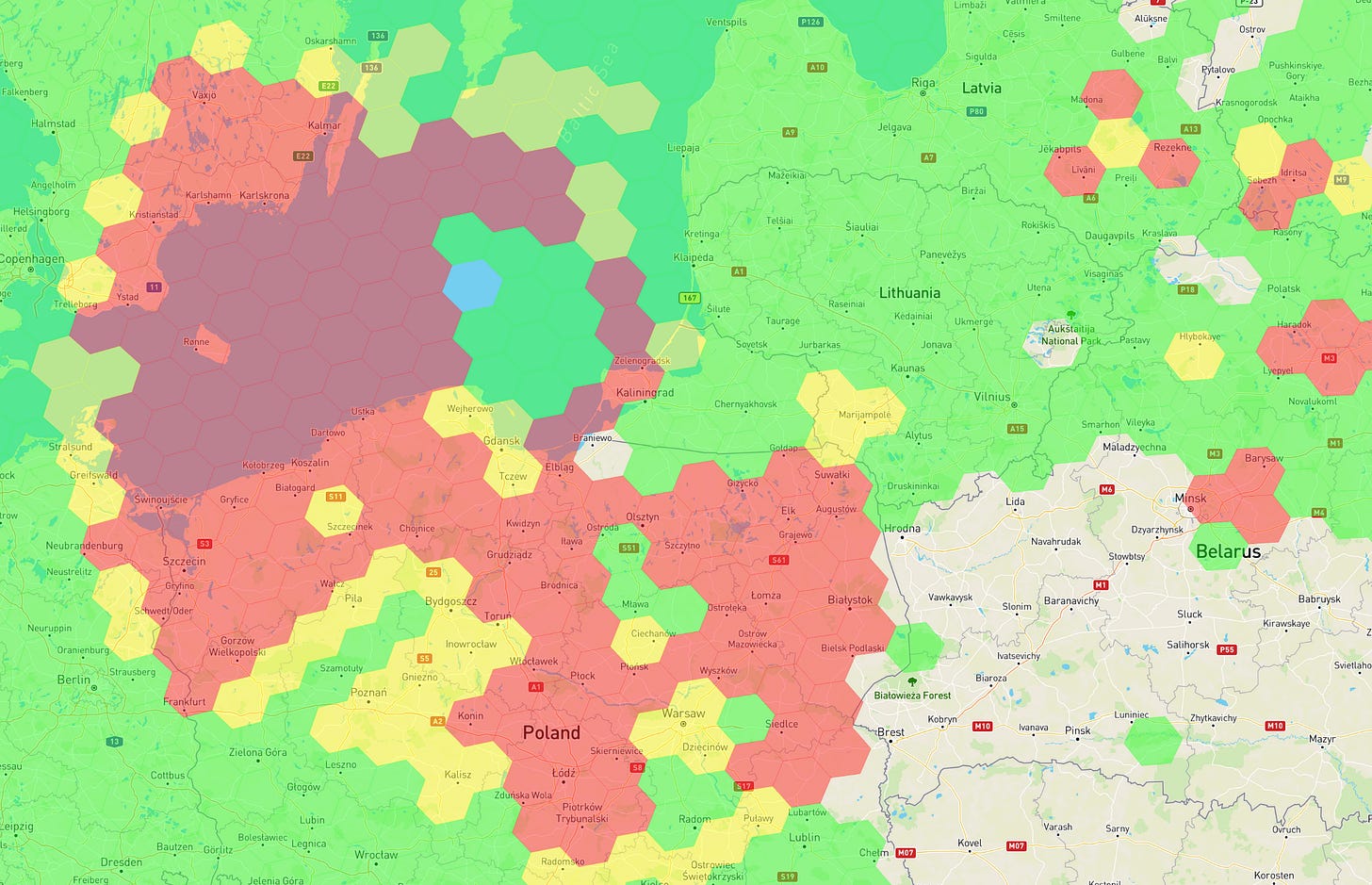Why Russia is jamming GPS again?
Moscow always tries to capitalise on its enemy's distractions
Remember when on 22nd January I’ve informed You about TOBOL System being responsible for GPS signal jamming over the NATO Easter Flank? Well looks like we’ve got another source that claims that this is exactly the device responsible for activities that were reported by several outlets over the span of last days. As Radio Free Europe claims German intelligence agencies are investigating the source of those “irregularities”. According to the available sources… The Russia is the state to point a finger on.
Here is the map of GPS signal jamming in the Baltic Sea Region. Sweden, Baltic Straits approach, Bornholm Island, the whole northern Poland and the whole area of so called Suwalki Gap and the remaining part of Poland’s eastern border were affected by those hostile activities:
Here is a quick look at the latest reports on the issue:
GPS Jamming: A Strategic Maneuver
Recent incidents of GPS signal disruptions across Eastern Europe, particularly in the Baltic Sea region, have drawn significant attention from military, security experts, and international observers. These disruptions, affecting airlines, smartphones, and military weapon systems, have been notably prevalent in Finland, Estonia, Latvia, and northern Poland. Despite the absence of direct evidence conclusively tying these activities to Russia, a pattern of electronic warfare (EW) capabilities, similar to those previously demonstrated in Ukraine, suggests Moscow's involvement. Such actions are interpreted as a strategic endeavor to test NATO's readiness for potential conflicts, with a broader aim of undermining the security infrastructure of the alliance.
The Suspected Russian Campaign
A series of investigations and reports have highlighted Russia's likely responsibility for the increase in GPS jamming incidents. Dana Goward, president of the Resilient Navigation and Timing Foundation, in a Breaking Defense op-ed dated January 31, 2024, emphasized the danger these acts pose to civilian lives and the operation of aircraft and ships in the Baltic region, Poland, and Sweden. Goward pointed to the daily occurrences of GPS disruptions, including both jamming and spoofing activities, as evidence of a deliberate strategy by Russia to test NATO's cohesion and its electronic warfare capabilities.
Ott Tammik and Aaron Eglitis of Bloomberg, in their report published on January 31, 2024, detailed statements from Martin Herem, commander of the Estonian Defense Forces, who suggested the escalation of interference from Finland to Poland and into the Black Sea region is a component of Russia's broader strategy. This strategy not only aims to refine Russia's EW capabilities but also to gauge NATO's response mechanisms in anticipation of future conflicts.
Evidence of Electronic Warfare
The pattern of disruptions, particularly around strategic locations like the Suwałki Gap, coupled with intensified jamming efforts in Russian cities such as Moscow and St. Petersburg, signifies a clear intent. These actions are ostensibly to counter drone attacks from Ukraine but also serve to demonstrate Russia's advanced EW capabilities. The Russian Defense Ministry's acknowledgment of past exercises in Kaliningrad, aimed at disrupting radio and satellite communications, further underscores the Kremlin's investment in such tactics.
International Concerns and Responses
The surge in electronic warfare activities has prompted warnings from aviation authorities in Poland and investigations by officials in Sweden and Finland. These incidents of jamming and "spoofing," where false signals mislead
navigation systems, have escalated safety concerns to a point where European aviation officials convened in Cologne to deliberate on countermeasures. The need for pilots and crews to be adept at handling such risks has never been more urgent.
German security agencies, as reported by Radio Free Europe/Radio Liberty, have been investigating targeted GPS disruptions affecting northeastern German airspace since December 2023. Russia's known capabilities and history of employing jamming shields have made it a prime suspect in these investigations.
The Tobol System: A New Threat
The Daily Mail, in a report by Miriam Kuepper on February 4, 2024, brought to light Western intelligence services' concerns regarding a top-secret Russian electronic weapon, named Tobol, based in Kaliningrad. This system, capable of causing significant navigational disruptions, has been implicated in the GPS interference experienced by civilian airlines and maritime traffic across NATO's eastern flank. The potential of the Tobol system, described as resembling a large satellite dish, to serve as a defensive mechanism against GPS-guided missiles while posing risks to civilian navigation, highlights the complex nature of modern electronic warfare.
The Broader Implications
These incidents of GPS jamming and spoofing, attributed to Russian sources, reflect a nuanced strategy aimed at testing NATO's defenses and assessing the alliance's ability to respond to electronic warfare threats. The implications of such actions are far-reaching, affecting not only military readiness but also civilian aviation safety and international law. The call for NATO to take decisive, proportional actions, including the potential denial of new satellite frequency allocations to Russia, underscores the urgency of addressing these threats.
Trenchlines under construction in Poland
But GPS jamming is one thing. Another is the NATO states activities in the area. In a detailed report by "Rzeczpospolita," the paper informs that fortifications are being silently constructed along the Polish border with Russia and Belarus, signaling a growing concern over potential security threats in the region.
Keep reading with a 7-day free trial
Subscribe to Rock Rachon to keep reading this post and get 7 days of free access to the full post archives.





